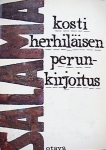anthropologist's journey to the past of a red village
The "history of a red village" is mainly about what happened before, during, and after the Korean War in a village in Southern Chungcheong province. The village is situated in Yesan County, and the place was back at that time so known for the leftist activity as to be called "Moscow of Yesan". For all the death and killing on both sides during the conflict, and for the political situation in the peninsula after the cessation of the war, it is no wonder that there are very little traces left of all the "reddishness" of the village. The villagers, whether surviving reds, their descendants or others, saw what the anthropologist wanted to find out about merely as "the past," which at one time had been denied of them and what in the modern (late 80s and 90s) Korea was of no use for the identity and the quality of life of the villagers. The villagers were not in a position to deny the consequences of the Korean development, as much as they have not been the main beneficiaries of it, because they felt that the life had gotten better - and that due to Park Chung-hee. (What does an anthropologist do when someone insists that it was thanks to president Park that her life has improved? Tell the informant to read a recent issue of Hankyoreh21? Explain that no, it cannot be that way? Or try to find out what's behind that personal personal experience?) What was now important and valid in their lives was the quality of live (chal salda); compared to the past life had improved a great deal, but compared to the wealthy middle class in cities their lives as consumers were poor. And they wanted to be the kind of consumers that the urban middle class was. Yoon Taek-lim has some discussion on the concept of minjung, with which I always don't quite agree, but perhaps I'll have to save that for another time or a more worthy arena... Update. The commentator "jook_when_ill" took issue with my above reference to anthropologists and Park Chung-hee nostalgy. On the second thought, he or she is correct that the take on anthros is not appropriate; I'm wrong to give an impression that Yoon Taek-lim wouldn't approve the villagers' views of Korea's development, on the contrary. From my thus far quite cursory reading it seems that she'd expected to see some of the old leftism reappear after the change of the political climate, but she no way expresses any dismay in the villagers' enthusiastic participation in the modern consumerism. What I had in mind is better represented in for example in net columns by the former editorial board membre that used to appear in Hankyoreh. The following quote is from a piece titled Ordinary people like Park Chung-hee? (편지 49) ‘서민’은 박정희가 좋다?)
I'm not sure if you imply that with that particular comment I tried to appeal to "the average left-hating korean expat blogreader", but if you've visited this place before you should have no reason to believe so. Update 2. This was not supposed to be a not about Park Chung-hee, but that's how it became, and I'm not the least to blame. So for now, I'll only add one quote from my own research notes. The following is what I wrote down after listening to a conversation between a rice mill keeper (himself a GNP voter) and two neighborhood women (one former grocery store keeper, the other kept a butcher's store with her husband), all close acquaintances. The three of them start talking about politics. It's 20 years since president Park Chung-hee was shot to death, and he has been a subject of much debate lately. The rice mill keeper doesn't think it's a good idea to give so much money to president Park's memorial hall. The women think it more in terms of what Park made for the Korean economy. The New Village Movement (Saemaŭl undong) and what it made for villages, consider how poor Korea was, when there was not enough to eat; when the new rice seed was introduced; the man himself was from poor surroundings. Even though his power was said to be dictatorial, would there have been any other way to feed this country. (About pres. Park, See Kim Eun Hee's text in Munhwa'e palmokchaphin Han'guk kyŏngje.) Categories at del.icio.us/hunjang: anthropology ∙ academic ∙ contemp.history ∙ Koreanhistory ∙ seomin |



Comments to note "anthropologist's journey to the past of a red village" (Comments to posts older than 14 days are moderated)
Write a Comment